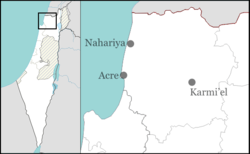Shtula
Shtula
שְׁתוּלָה | |
|---|---|
 | |
| Etymology: "Planted" | |
| Coordinates: 33°5′8″N 35°18′47″E / 33.08556°N 35.31306°E | |
| Country | |
| District | Northern |
| Council | Ma'ale Yosef |
| Affiliation | Moshavim Movement |
| Founded | 1967 |
| Founded by | Galilee moshavniks |
| Population (2022)[1] | 311 |
| Website | www.shtula.org.il |
Shtula (Hebrew: שְׁתוּלָה, lit. 'Planted') is a moshav in northern Israel. Located in the Upper Galilee near the Lebanese border, it falls under the jurisdiction of Ma'ale Yosef Regional Council. In 2022 it had a population of 311.[1]
History
[edit]Moshav Shtula was established in 1967 as part of a program to strengthen the Jewish presence in the Galilee. Many members of the community were immigrants from the Iraqi town of Koy Sanjaq and children in the moshav were taught Jewish Neo-Aramaic.[2]
The moshav is located on the land of the Palestinian villages of Suruh and Tarbikha, which were depopulated in the 1948 Arab–Israeli War.[3]
The village was the site of Hezbollah's cross-border raid in the 2006 Lebanon War, in which three Israeli soldiers were killed and two captured.[citation needed]
In 2006, a resident of Shtula, Sara Khatan, was honored with lighting a torch on Israel Independence Day for her contribution to Upper Galilee tourism.[4]
In 2014, a resident of Shtula alerted the Hebrew University Cave Research Unit to a deep cave near the moshav. The researchers declared it a record for Israel at 187-meters deep.[5]
Amidst the conflict between Hamas and Israel, Hezbollah militants targeting northern Israeli border communities, necessitated the evacuation of several, including Shtula. On October 14, a Hezbollah-launched anti-tank missile struck Shtula, resulting in the death of one person and the injury of three others.[6]
References
[edit]- ^ a b "Regional Statistics". Israel Central Bureau of Statistics. Retrieved 21 March 2024.
- ^ Hoberman, Robert D. (1985). "The Phonology of Pharyngeals and Pharyngealization in Pre-Modern Aramaic". Journal of the American Oriental Society. 105 (2): 221–231. doi:10.2307/601702. ISSN 0003-0279.
- ^ Khalidi, W. (1992). All That Remains: The Palestinian Villages Occupied and Depopulated by Israel in 1948. Washington D.C.: Institute for Palestine Studies. pp. 32, 34. ISBN 0-88728-224-5.
- ^ טקס הדלקת המשואות
- ^ Mapping Israel’s deepest cave
- ^ Tuqa, Khalid. "Israel's military strikes Lebanon targets after Hezbollah claims fire on border town".
External links
[edit]- Official website (in Hebrew)


